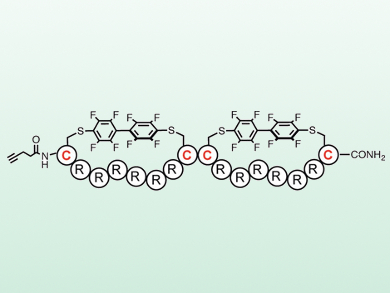Antisense oligonucleotides, such as phosphorodiamidate morpholino oligonucleotides (PMOs), are a promising class of therapeutics for genetic diseases such as Duchenne muscular dystrophy (DMD). Binding cell-penetrating peptides (CPPs) to these therapeutics can improve their cellular uptake. In particular, arginine-rich CPPs are highly effective for PMO delivery. However, arginine-rich CPPs can also have poor proteolytic stability.
Bradley L Pentelute, Massachusetts Institute of Technology (MIT), Cambridge, USA, and colleagues have prepared bicyclic variants of arginine-rich CPPs (pictured). The team developed two methods to synthesize bicyclic peptides by crosslinking cysteine residues with perfluoroarenes. Then, the bicyclic peptides were covalently linked to a phosphorodiamidate morpholino oligonucleotide (PMO).
The bicyclic peptides show enhanced proteolytic stability compared with a monocyclic peptide. Additionally, the covalent bicyclic peptide-PMO conjugates show a 14-fold increase in activity in a cellular assay for PMO activity compared with unconjugated PMO. According to the researchers, perfluoroaryl bicyclic CPPs are valuable new PMO delivery agents. Moving forward, these types of modified CPPs may prove useful for delivering other macromolecular cargos.
- Perfluoroaryl Bicyclic Cell-Penetrating Peptides for Delivery of Antisense Oligonucleotides,
Justin M. Wolfe, Colin M. Fadzen, Rebecca L. Holden, Monica Yao, Gunnar J. Hanson, Bradley L. Pentelute,
Angew. Chem. Int. Ed. 2018.
https://doi.org/10.1002/anie.201801167




